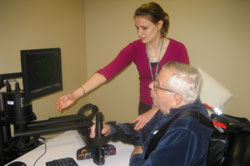Last summer PhRMA reported there are 19 stroke drugs in clinical trials, with GlaxoSmithKline ($GSK), Pfizer ($PFE) and Sanofi ($SNY) all vying to bring a product to market. Recent history suggests many of these compounds will flunk Phase III trials, but if a robotics team at MIT has its way the failures will at least be faster and cheaper than in the past.
 |
| Researchers test a robotic arm for stroke drug trials--Courtesy of MIT |
Stroke drugs have a weak record in late-phase trials, with AstraZeneca ($AZN) and others failing to turn promising animal data into clinical success. Recognizing that such failures are costly, time consuming and dent willingness to invest in new candidates, researchers at MIT are working with staff at Johnson & Johnson ($JNJ), Biogen Idec ($BIIB) and other organizations to improve trials. The plan centers on the use of robotic measurements of arm movements as a biomarker for recovery from a stroke.
Patients play a video game using a robotic arm, which helps with movements as necessary. As the patient moves the arm a computer logs the user's speed, movement smoothness and aim. To date the tool has primarily been used as a rehabilitation aid, but writing in the journal Stroke the researchers make a case for its use in clinical trials. Tests suggest data gathered by the robot could be a more sensitive way to measure a patient's recovery--and therefore the effect of a drug--than standard clinical outcome measurements.
As well as giving an accurate indication of whether a drug works, the increased sensitivity could enable smaller, less expensive trials. The team calculate a robotic-supported trial would only need to enroll 240 patients. "Robotic measurements will help us identify promising treatments with smaller numbers of patients and provide better insight into the mechanisms of the treatments, so that we can target those mechanisms and improve the treatments," David Reinkensmeyer, a professor of physical medicine at the University of California at Irvine, told MIT News.
- here's the Stroke abstract
- read MIT News' post
Special Report: Fierce's top 5 feats in life sciences 'gamification'